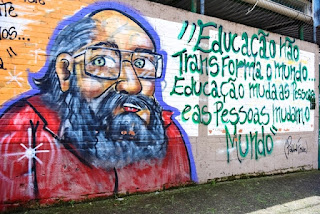By The Elevate Team & Olga Cam
Introduction
Education for Sustainable Development (ESD) is a key current priority for the University. Many colleagues across the University are addressing ESD and embedding it into their teaching. We recently spoke to Olga Cam, a lecturer in the Management School. We asked Olga some questions about a specific module, Introduction to Financial Accounting (MGT 132, a L1 core module), and how she embeds ESD in her practice.
 |
| Paulo Friere - “Education does not change the world. Education changes people, and people change the world”. (Image by Claudia Velho, used under a creative commons licence) |
How does Education for Sustainable Development relate to the discipline (accountancy)?
“Sustainability is a philosophy that is supported by large-scale societal movements. To secure sustainable living goals, we need to embed sustainability philosophy in how we live and conduct our businesses. Accounting is an everyday communicative practice, central to organisational decision-making, and it has the potential to be a tool for supporting the sustainability agenda. Students who study accounting will become accountants and/or take on the roles of key decision-makers ( e.g. CFOs and CEOs.) within various for-profit and not-for-profit organisations. They will find themselves in a position to influence the way organisations operate and to enable practices that contribute to sustainable futures.
However, it is widely acknowledged that in its current form, accounting is shaped as a closed system which is not fully compatible
with sustainability thinking that demands an open inter-systemic approach. Therefore the challenge for researchers, educators and
professionals is to move beyond the currently accepted view of accounting as a fixed set of technical tools used to manage
economic capital and maximise profits, and instead to enable the evolution of accounting as a social subject that can translate
into sustainability-supporting practices.”
How does this module help students imagine and evaluate alternative futures,
and in what ways?
“This core 1st-year module is foundational (and crucial) to the whole program. It teaches students about current accounting
applications to support the development of their practical employability skills. At the same it helps our students to imagine and
evaluate alternative business arrangements by embedding different perspectives on accounting throughout the reading material,
lectures' content and discussion, and assessment tasks.
From the beginning of the module, learning the existing basic accounting techniques is set in a socio-historical context to show the
changing nature of accounting. This is important as it introduces students to current practice as well as gets them to consider
the changing nature of the subject. The idea is to invite students to go beyond being passive reality takers and instead to adopt
the role of professional reality makers. The module learning activities and assessments encourage students to think about what
sustainability means in accountancy, the limitations of current practices for embedding sustainability and moving beyond
the accepted account application and the role of accounting.”
What skills do your students develop during their studies to help them challenge the mindsets
and priorities that drive unsustainable development?
“Critical thinking is critical consciousness, i.e., understanding that we create our history and reality as humans. So the aim is
for the students to become professionally confident to be employed but at the same time to be the kind of professional
who understands that they are the creators of human history in multiple contexts , including their professional one. Therefore,
the power of enabling sustainable living lies with them.”
How do you empower students to take professional responsibility
for sustainable development as they move into employment?
“The overall aim is for graduates to be aware of their role in constructing the professional reality, to be more imaginative, be able
to make decisions, deal with grey areas, have a flexible mindset and to appreciate that demands on the business go far beyond
financial profit-making alone.“
How are the module's learning activities and assessment(s) designed to support
students' knowledge and skill development in sustainability?
“Sustainability is a philosophy of living, it therefore can not just be slotted as a free-standing add-on topic. It needs to
permeate the module at its core, and it demands alternatives to didactic teaching approaches that can work within a given
module’s parameters. In the MGT 132, we successfully drew from Paolo Freire's (2005)* dialogical pedagogy. The dialogical
approach facilitates a praxis-enabling education that encourages learners to question their position within a given historical
context. Through open dialogue with others, students can develop individual views of what they see as alternatives,
thus becoming critically conscious of their situation and capable of new reality making.
The dialogical elements were embedded in the module as contextual background to facilitating the development of
practical accounting skills. For example, we use the open board discussions tool; students are invited to reflect on their
own experiences and background in the lectures and seminars.
We also introduce an alternative to MCQs and essay-based responses for part of their assessment in this module. Instead, we
successfully tried a task-based portfolio - a series of short tasks, some technical, some more around theory/context/skills. In one
of these tasks, we incorporated an independent enquiry into the range of the topics, including accounting history, technical application, and understanding of stakeholders. The final task culminated in finding definitions of sustainability and reflecting on how it related to what they have learned.
The purpose of the assignment (and the teaching methods of the module) is to engage students in a dialogical process where there isn't a 'right' or 'wrong' answer. The rationale for this is explained in detail to students to understand the reasoning behind the assessment choice and why it will benefit them alongside other assessment formats.”
*Freire, P. (2005). Pedagogy of the oppressed. New York : Continuum.
For more information and guidance on embedding ESD into your teaching, please see the Elevate ESD webpage.